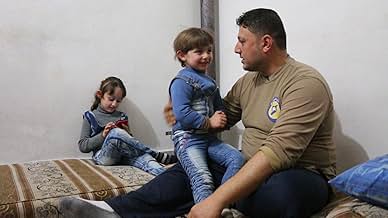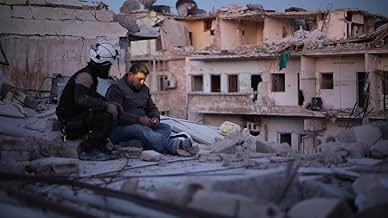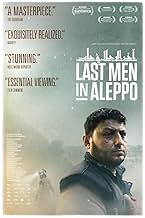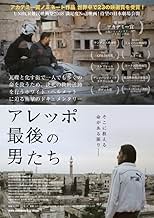IMDb-BEWERTUNG
7,4/10
3078
IHRE BEWERTUNG
Khaled, Mahmoud und Subhi haben sich freiwillig bei den Weißhelmen gemeldet, um das Leben hunderter Opfer im belagerten Aleppo während des syrischen Bürgerkriegs zu retten.Khaled, Mahmoud und Subhi haben sich freiwillig bei den Weißhelmen gemeldet, um das Leben hunderter Opfer im belagerten Aleppo während des syrischen Bürgerkriegs zu retten.Khaled, Mahmoud und Subhi haben sich freiwillig bei den Weißhelmen gemeldet, um das Leben hunderter Opfer im belagerten Aleppo während des syrischen Bürgerkriegs zu retten.
- Regie
- Drehbuch
- Hauptbesetzung
- Für 1 Oscar nominiert
- 26 Gewinne & 17 Nominierungen insgesamt
Mahmoud Alheter
- Self - volunteer rescue worker
- (as Mahmoud)
Empfohlene Bewertungen
Not all movies are fun, and this one sure isn't. But that doesn't mean it isn't a good movie.
The emotions raised in this movie are one's of disgust and sympathy. Disgust for the actions of the Syrian government, and its Russian allies, in bombing the crap out of one of their own cities (Aleppo). The destruction portrayed here is, frankly unimaginable, as you see the bombs being dropped on a city that probably has more bombed out homes and apartments than livable ones. How, you can't help but ask, can a government do that to its own people? Is there really any justification for this kind of behavior?
There aren't many reviews in IMDB for this movie, but one of them is from a Syrian government sympathizer who claims that the images and story presented here are nothing but anti-government propaganda. Well, if that is what it is, then they have gone to incredible lengths to create an alternative, fictional universe and the filmmakers deserve awards not for documentary feature, but best special effects. I don't know how you could fake many of these scenes.
The sympathy comes from the story that unfolds in this documentary for a small band of dedicated Aleppans (?) called the White Helmets. These people are sort of the equivalent of a fire department, except that fighting fires is probably the smallest part of their job. Mostly they spend days on end digging people, some of them alive, but most of them dead, out from under the collapsed buildings where they used to live. Most of the bodies are those of children and women and the horror of finding unattached limbs is not sugar-coated here. How you ask, can these people continue to live here.
And, an even bigger question is how can these White Helmets do this kind of work day after day? We see one of the men, a leader of one of the brigades, find some small amount of solace in creating a gold-fish pond in his courtyard. His love for his family, and his city, is so strong and, especially at the end, it is difficult not to cry for him.
This is not a feel-good movie - there is no way you can laugh during this movie, nor feel better about the prospects of these people. But it is a powerful and effective documentary that opens your eyes to both what is evil in men, and how much good can be found in those who fight it. I give this 4 stars (out of 5).
The emotions raised in this movie are one's of disgust and sympathy. Disgust for the actions of the Syrian government, and its Russian allies, in bombing the crap out of one of their own cities (Aleppo). The destruction portrayed here is, frankly unimaginable, as you see the bombs being dropped on a city that probably has more bombed out homes and apartments than livable ones. How, you can't help but ask, can a government do that to its own people? Is there really any justification for this kind of behavior?
There aren't many reviews in IMDB for this movie, but one of them is from a Syrian government sympathizer who claims that the images and story presented here are nothing but anti-government propaganda. Well, if that is what it is, then they have gone to incredible lengths to create an alternative, fictional universe and the filmmakers deserve awards not for documentary feature, but best special effects. I don't know how you could fake many of these scenes.
The sympathy comes from the story that unfolds in this documentary for a small band of dedicated Aleppans (?) called the White Helmets. These people are sort of the equivalent of a fire department, except that fighting fires is probably the smallest part of their job. Mostly they spend days on end digging people, some of them alive, but most of them dead, out from under the collapsed buildings where they used to live. Most of the bodies are those of children and women and the horror of finding unattached limbs is not sugar-coated here. How you ask, can these people continue to live here.
And, an even bigger question is how can these White Helmets do this kind of work day after day? We see one of the men, a leader of one of the brigades, find some small amount of solace in creating a gold-fish pond in his courtyard. His love for his family, and his city, is so strong and, especially at the end, it is difficult not to cry for him.
This is not a feel-good movie - there is no way you can laugh during this movie, nor feel better about the prospects of these people. But it is a powerful and effective documentary that opens your eyes to both what is evil in men, and how much good can be found in those who fight it. I give this 4 stars (out of 5).
Tough movie to watch. Tougher to read the reviews of dumb conspiracy theorists who think George Soros can cause solar eclipses and the such. It's actually a remarkably unpolitical film, but follows the day by day lives of firemen in Aleppo. It's pretty tragic, but the humanity of the people in Syria shine through.
Ooff....I can't even.
How do you review a movie like "Last Men in Aleppo?" It's about as opposite from entertaining as you're likely to get, yet it should be watched by everybody. It's incredibly urgent, yet it's so lacking in hope that it seems naive to think it will inspire any kind of action or change. It's basically an obituary for a country that hasn't completely died yet, but is certainly dying. And doing so while the world stands back and watches.
Last year, the film that won the Academy Award for Best Documentary Short Subject was about a member of the White Helmets, a volunteer emergency response group in Syria. He enjoyed 15 minutes of fame when footage of him pulling a living baby from rubble circulated the Internet. That man is now the focus of "Last Men in Aleppo," a film that chronicles his life and eventual death as a member of the White Helmets. Whereas "The White Helmets," in that image of a rescued baby, offered some ounce of hope to cling to, "Last Men in Aleppo" offers nothing but despair. It's the kind of movie that makes it difficult to go about your daily life. The mundane minutiae of being a privileged American -- my biggest annoyance right now is that the motion-sensor light on my garage needs to be replaced -- make me almost embarrassed to enjoy a life of extreme luxury compared to the living conditions of these poor poor people in Syria. That the developed world stood back and watched this conflict happen with a shrug of its collective shoulders will go down in history as one of its most shameful moments.
Grade: A
How do you review a movie like "Last Men in Aleppo?" It's about as opposite from entertaining as you're likely to get, yet it should be watched by everybody. It's incredibly urgent, yet it's so lacking in hope that it seems naive to think it will inspire any kind of action or change. It's basically an obituary for a country that hasn't completely died yet, but is certainly dying. And doing so while the world stands back and watches.
Last year, the film that won the Academy Award for Best Documentary Short Subject was about a member of the White Helmets, a volunteer emergency response group in Syria. He enjoyed 15 minutes of fame when footage of him pulling a living baby from rubble circulated the Internet. That man is now the focus of "Last Men in Aleppo," a film that chronicles his life and eventual death as a member of the White Helmets. Whereas "The White Helmets," in that image of a rescued baby, offered some ounce of hope to cling to, "Last Men in Aleppo" offers nothing but despair. It's the kind of movie that makes it difficult to go about your daily life. The mundane minutiae of being a privileged American -- my biggest annoyance right now is that the motion-sensor light on my garage needs to be replaced -- make me almost embarrassed to enjoy a life of extreme luxury compared to the living conditions of these poor poor people in Syria. That the developed world stood back and watched this conflict happen with a shrug of its collective shoulders will go down in history as one of its most shameful moments.
Grade: A
"There is nothing intelligent to say about a massacre. Everybody is supposed to be dead, to never say anything or want anything ever again. Everything is supposed to be very quiet after a massacre, and it always is, except for the birds. And what do the birds say? All there is to say about a massacre, things like 'Poo-tee-weet?'" Kurt Vonnegut, Slaughterhouse-Five
Call it what you will, Syria's President Assad's pummeling his people with the aid of Russian bombers is genocide plain and simple. You do not want to see the blunt documentary Last Men in Aleppo if you support Assad or can't stomach The White Helmets pulling dead babies from rubble.
What you will see, however, is a first-rate rendering from the streets of Helmet heroic citizens risking their lives to save the victims of the destruction. The doc concentrates on Khaled Omar, a founder of the Helmets, looking for people to save all the time staying in contact through cell with his family. On occasion he plays with the kids at an oasis of a playground.
Therein lies the supreme irony of people trying to survive holocaust and trying to retain the dignities of normal life. As one Helmet says, "Should we sit down and cry or what?" Actually only the words of the survivors can get even close to understanding genocide in our own time, 250,000 Syrians dead since the purge began in 2011.
Although Khaled and his crew save adults as well, the children are the starkest notion of cruelty on a mass basis and the loss of future for everyone, as Khaled says profoundly and prophetically, "The dilemma is the children." Despite the discursive narration and exposition that seem to randomly course among the ruins, the cumulative effect of sorrow and brief joy is to give us an unforgettable documentary experience, even if we go back to our democratic safety zones, creating a few potholes on an airstrip while the city burns.
"The horror! The horror!" Joseph Conrad's Kurtz in Heart of Darkness
Call it what you will, Syria's President Assad's pummeling his people with the aid of Russian bombers is genocide plain and simple. You do not want to see the blunt documentary Last Men in Aleppo if you support Assad or can't stomach The White Helmets pulling dead babies from rubble.
What you will see, however, is a first-rate rendering from the streets of Helmet heroic citizens risking their lives to save the victims of the destruction. The doc concentrates on Khaled Omar, a founder of the Helmets, looking for people to save all the time staying in contact through cell with his family. On occasion he plays with the kids at an oasis of a playground.
Therein lies the supreme irony of people trying to survive holocaust and trying to retain the dignities of normal life. As one Helmet says, "Should we sit down and cry or what?" Actually only the words of the survivors can get even close to understanding genocide in our own time, 250,000 Syrians dead since the purge began in 2011.
Although Khaled and his crew save adults as well, the children are the starkest notion of cruelty on a mass basis and the loss of future for everyone, as Khaled says profoundly and prophetically, "The dilemma is the children." Despite the discursive narration and exposition that seem to randomly course among the ruins, the cumulative effect of sorrow and brief joy is to give us an unforgettable documentary experience, even if we go back to our democratic safety zones, creating a few potholes on an airstrip while the city burns.
"The horror! The horror!" Joseph Conrad's Kurtz in Heart of Darkness
Full review on my blog max4movies: De sidste mænd i Aleppo (international title: Last Men in Aleppo) is a documentary about the White Helmets, a voluntary nonprofessional organization in Syria that has been helping people after bomb attacks since the civil war started in 2013. The documentary features footage that was shot between 2013 and 2017 and mostly focuses on three young men and their dilemma whether to stay or leave Aleppo. There is few information provided and no additional material was used (like interviews or external media coverage), which is why the documentary feels authentic but also raw. The conflict in Syria is a contemporary geopolitical crisis and, thus, the documentary is topical, important, and although few scenes actually contain graphic violence or gore, the catastrophe feels personal and heart-breaking. Although there are some technical drawbacks (e.g., structure and editing), the subject matter is simply too important to disregard.
Wusstest du schon
- WissenswertesAlle Einträge enthalten Spoiler
- VerbindungenFeatured in Die 90. Oscar-Verleihung (2018)
Top-Auswahl
Melde dich zum Bewerten an und greife auf die Watchlist für personalisierte Empfehlungen zu.
Details
- Erscheinungsdatum
- Herkunftsländer
- Offizieller Standort
- Sprache
- Auch bekannt als
- Last Men in Aleppo
- Drehorte
- Aleppo, Syria(location)
- Produktionsfirmen
- Weitere beteiligte Unternehmen bei IMDbPro anzeigen
Box Office
- Bruttoertrag in den USA und Kanada
- 14.637 $
- Eröffnungswochenende in den USA und in Kanada
- 1.505 $
- 7. Mai 2017
- Weltweiter Bruttoertrag
- 14.637 $
Zu dieser Seite beitragen
Bearbeitung vorschlagen oder fehlenden Inhalt hinzufügen




















